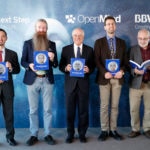Francisco González: "We are competing to be the Amazon or Netflix of banking"
BBVA Global Executive Chairman Francisco González presented 'The Next Step: Exponential Life', the ninth book in the annual collection BBVA publishes as part of its OpenMind initiative. On this occasion, 20 international experts reflected on the immense opportunities so-called “exponential technologies” offer humanity, but also the associated risks and unknowns.

More than 200 authors now participate in OpenMind, BBVA’s collaborative platform to generate and share knowledge with the potential to benefit society and “bring the age of opportunity to everyone.” This digital community provides free access to books, articles, interviews, videos and infographics for a growing audience. The Next Step: Exponential Life is available at no charge in Spanish and English in different formats.
| Download complete book | |||
|
|||
At the book presentation in Madrid, Francisco González engaged in a dialogue with Dave Birch, a fintech expert and the Director of Innovation at Consult Hyperion. BBVA’s Global Executive Chairman stressed that any of the exponential technologies – mobile computing, big data, bioengineering, robotics, artificial intelligence or the Internet of Things – has enormous power on its own, but “the interaction among them is what makes the difference because they are capable of erasing the borders between the physical, digital and biological world.”
Consumers “will be the real winners in this fourth industrial revolution,” BBVA Global Executive Chairman said. “They will have access to better and cheaper goods and services.” Although Francisco González admits that “these changes are also creating confusion and anxiety in our societies because people are worried about their jobs,” he is firmly convinced that “better jobs will be created in the medium to long term, just as in previous revolutions.”
“The transition can be tough for many people,” he warned, “and our governments and societies will have to implement appropriate policies to make the process easier.”
Exponential banking technologies
In the case of the financial industry, many exponential technologies are reaching banks already, propelling a transformation that “will create enormous benefits for customers in terms of the quality, variety and price of products. And it will allow millions of lower income people around the world to access financial services, improving their quality of life and their opportunities to prosper,” said BBVA’s Global Executive Chairman. From a macroeconomic perspective, “this represents a structural reform that will promote growth and reduce poverty and marginalization.”
“We are moving toward a new and better financial industry,” he added, “but we don’t know what its final configuration will look like and whether banks will have a significant position in it, or none at all. So far, digital competitors’ inroads in the financial sector have only been marginal, so banks still have some time to address their shortcomings.”
“We are competing to be the Amazon or Netflix of banking. And we are confident that BBVA will be one of the winners in this competition,” concluded Francisco González.

BBVA Global Executive Chairman Francisco González presented 'The Next Step: Exponential Life', the ninth book in the annual collection BBVA publishes as part of its OpenMind initiative.
Joining BBVA’s Global Executive Chairman in the presentation were Aubrey de Grey, gerontologist and Chief Scientist at SENS Research Foundation; Jonathan Rossiter, Robotics Professor at the University of Bristol; and Matthew Liao, Bioethics Professor at New York University.
Revert the aging process
Aubrey de Grey has said “it’s possible to reverse the aging process through the reparation of molecular and cellular damage.” The British gerontologist, who has revolutionized anti-aging research, maintains that aging is simply a curable illness and that it is possible “to recover the molecular and cellular and structure of a young adult, postponing to a great extent all the symptoms associated with illnesses and disability in old age.”
The research being carried out at the SENS Foundation, where he is the chief scientist, “seeks to truly reverse aging, instead of simply postposing it, thanks to the interaction between bio gerontology and regenerative medicine.”
One of the great allies of regenerative medicine in winning the battle against aging will be robotics, added Jonathan Rossiter, during the presentation of the new OpenMind book. Specifically, he mentioned soft robots, because of their capacity to interact with biological tissue and to be processed and assimilated by our metabolism.
“Nothing in society or our lives will be foreign to the influence of robotics. We’ll have nanorobots to monitor and eliminate cancer and robots to keep us company so we don’t get lonely in old age; robots that will lead the colonization of planets and biodegradable machines that can supervise and repair the natural environment,” said Rossiter, a professor at the University of Bristol.
Matthew Liao shares Rossiter’s conviction that the very technology that poses a threat to our planet may be the key to its survival. In his article, Liao proposes exploring a new kind of solution to climate change. He calls it “human engineering,” which includes biomedical modifications of people so that they can mitigate and better adapt themselves to the effects of climate change. His proposal “is conceived as a voluntary activity – driven perhaps by initiatives such as tax exemptions or health care assistance – and not obligatory or forced.”
Liao, a professor of Bioethics at New York University, describes four examples of human engineering that can possibly be implanted in the near future: inducing pharmacological intolerance to meat; reducing the size of human beings through dietary modifications and changes in the criteria for the selection of embryos in assisted reproduction procedures; reducing birth rates through intelligence enhancers; or inducing altruism and empathy through medicines.



